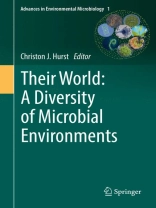This volume summarizes recent advances in environmental microbiology by providing fascinating insights into the diversity of microbial life that exists on our planet. The first two chapters present theoretical perspectives that help to consolidate our understanding of evolution as an adaptive process by which the niche and habitat of each species develop in a manner that interconnects individual components of an ecosystem. This results in communities that function by simultaneously coordinating their metabolic and physiologic actions. The third contribution addresses the fossil record of microorganisms, and the subsequent chapters then introduce the microbial life that currently exists in various terrestrial and aquatic ecosystems. Coverage of the geosphere addresses endolithic organisms, life in caves and the deep continental biosphere, including how subsurface microbial life may impact spent nuclear fuel repositories. The discussion of the hydrosphere includes hypersaline environments and arctic food chains. By better understanding examples from the micro biosphere, we can elucidate the many ways in which the niches of different species, both large and small, interconnect within the overlapping habitats of this world, which is governed by its microorganisms.
قائمة المحتويات
Towards a unified understanding of evolution, habitat and niche.- Defining the concept of a species physiological boundaries and barriers.- Microbes and the fossil record – selected topics in paleomicrobiology.- Endolithic microorganisms and their habitats.- The snotty and the stringy: energy for subsurface life in caves.- Microbiology of the deep continental biosphere.- Microbiology of the deep subsurface geosphere and its implications for used nuclear fuel repositories.- Life in hypersaline environments.- Microbes and the arctic ocean.












